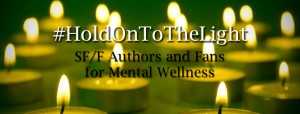
Hold On To The Light is probably advice that all of us c/should live by. But for those whose lives have been harrowed by one or more mental/emotional/behavioral challenges, this phrase achieves the status—and significance—of a mantra. Because in the dark hours of the night, when sleep does not come to draw its blackout curtain across the notional gargoyle-presences spawned by those challenges, the afflicted have only one recourse: determination and raw guts, anchored to the light of a seemingly distant hope, seen at the end of a long tunnel of isolation.
We all have some experience with that outlook. There is no broken heart, no worrisome diagnosis, or pending medical test, that has not cost us a night’s sleep, somewhere along the timeline of our existence. But I dedicate what I have included below to those who daily awaken to the knowledge that they are once again rising into a state of siege: that the adversary cannot be surgically removed or excised, and that their battle is endless, for that foe is always ready to pounce upon any loss of resolve, any sideways stumble, any weakness.
I have seen numerous family members grapple with many such conditions. And if the bestiary of those adversaries is diverse—depression, anxiety, addiction, PTSD, any of the conditions now linked under the unified genera “autism spectrum”, more—these variform demons all evince this dark commonality: that those whom they haunt must live with a weight that they cannot shed. Rather, their victims can only carry the burden with as much determination, strength, and grace as human nature allows.
This excerpt from the forthcoming web-serialized novel The Gathering Storm (with Eric Flint, Kevin J. Anderson, and Marko Kloos), is my brief, awkward attempt to honor all their ongoing struggles in the form of one veteran’s battle with PTSD and addiction.
* * *
Opium. Reflex turned Conrad von Harrer’s head toward his battered wooden night table. Resting on the stained top, a cracked and yellowed meerschaum imp adorned the Hungarian-made bowl he had purchased for his opium pipe. His two eyes locked on the imp’s one. If only he could outstare it, then he could reject it. But the meerschaum imp was like the opium; the more one tried to defy it, the more one realized that there was nothing to defy except oneself. It was a game, the type a child plays when trying to trick its own reflection in a mirror.
A honey-thick torpor overcame von Harrer while his gaze was still fixed on the pipe. Time passed and the difference between seconds and minutes—or hours—became indistinct, meaningless. He watched as the imp’s face lost its yellowish glaze, gradually deepened to amber as the sun moved from the center of the sky toward the horizon. The one laughing eye still glared upward: puckish, sardonic, leering. A leer like those worn by the fire-bleached skulls outside Mafeking, Kimberley, and in the ruins of Johannesburg: leers which evoked no mirth, only desolation.
When Conrad’s eyes once again showed him the world of the present, he saw that the last light was fading, giving way to darkness. The orange sun had grown larger and murkier, diffusing itself across the light-smeared horizon. On his first approach to Al Qahira, von Harrer had tarried to sit on the sands at Giza and watch the sunset glaze the pyramids: fading triangles that sat squat and timeless on the horizon. His mind’s eye could still make out the cowl of the sphinx, the faint light limning its supine contours. It was an enigmatic posture, a recline that did not suggest rest but, rather, endless watching. A pitiless gaze which had seen the death of many an age, perhaps many a species. It was easy to believe that such blank eyes had always looked out on barrenness, knew nothing else, could augur nothing else.
Von Harrer let his own gaze slip from the window and back into the room, rolling like a lazy ball from one empty corner to another. His eyes touched the spaces that had once been occupied by his possessions: a lamp with crystal pendants, a little mahogany liquor cabinet, a roll-top desk, and a dresser. Faint shadows on the floor marked their old territories, darker where the boards had been spared the bleaching stare of the sun.
All gone now. All gone to the same place. He turned his eyes back to the meerschaum pipe-bowl. All gone there.
Cravings jumped up at the thought, the sight, of the pipe. The meerschaum eyes laughed, invited: just once more.
He turned away, looked at the bare wall on the opposite side of his bed. He could still feel that mocking leer boring into his back, the dull ivory eyes promising: you’ll almost forget.
You’ll almost forget the clusters of dart-shaped steel rods that screamed down from nearly twenty miles above Johannesburg, glowing with heat when they impacted, the ground vomiting upward in waves, shot through with flame—right before the blast knocked everything flat.
You’ll almost forget the airships hovering out of rifle range, dropping bomb after bomb, only leaving to get more from Rhodes’ secret arsenals of death, hidden safe behind the British lines.
You’ll almost forget the endless litter of civilian dead on the retreat back through what was left of Johannesburg, particularly the children, their little bodies blown apart by the concussive forces, their little heads—blonde, brown, and black—rolled up against walls or into ditches like those of decapitated dolls.
You’ll almost forget the defeat, the camps, the dysentery, the hunger, the vengeful African guards and, finally, the stumbling silhouettes of the internees who were evicted due to disease or frailty. Within the first one hundred yards, each one unfailingly attracted a loping cluster of cape dogs or jackals, whose patience was invariably rewarded by a taste of human flesh.
But opium’s promise of forgetfulness was a lie. The memories never evaporated; they were simply disordered. Even when his head was filled to the point of nausea with the musk-sweet fumes, visions of the past always trespassed upon the present. But instead of complete scenes of the so-called Greater Boer Insurrection, they came as splintered flashes of carnage, each image frozen onto a shard of the shattering mirror that was his mind, his memories.
* * *
For those interested, The Gathering Storm is set in 1903, but in a world where a single alteration of physics—that the Michaelson-Morley experiment at Carnegie Mellon did in fact detect the expected existence of aether—began changing history in the 1880s. The aether-assisted air-craft and even space-craft changed history in this universe where alternate physics has created a Dark Edwardian downturning. Characters as diverse as Churchill, Tesla, Wells, Roosevelt, Rhodes move among the shadows of a past tinctured by both streampunk and hard sf sensibilities.
I hope you’ll keep an eye out for it, starting in 2017. ——Chuck Gannon
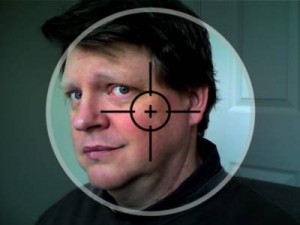 About the author: Dr. Charles E. Gannon is a Distinguished Professor of English at St. Bonaventure University, where he was the Director of Graduate English until he became a full-time author in 2007. A Fulbright Senior Specialist in American Literature and Culture from 2004 to 2009, his most recent non-fiction book is “Rumors of War and Infernal Machines: Technomilitary Agenda Setting in American and British Speculative Fiction.” Now in second edition, it won the 2006 American Library Association Award for Outstanding Book, and was the topic of discussion when he was interviewed by NPR (Morning Edition).
About the author: Dr. Charles E. Gannon is a Distinguished Professor of English at St. Bonaventure University, where he was the Director of Graduate English until he became a full-time author in 2007. A Fulbright Senior Specialist in American Literature and Culture from 2004 to 2009, his most recent non-fiction book is “Rumors of War and Infernal Machines: Technomilitary Agenda Setting in American and British Speculative Fiction.” Now in second edition, it won the 2006 American Library Association Award for Outstanding Book, and was the topic of discussion when he was interviewed by NPR (Morning Edition).
Among various media appearances, his most recent was as an expert commentator on The Discovery Channel’s second installment of its premier series “Curiosity”. Along with 45 other SF writers (such as David Brin, Ben Bova, Larry Niven, Jerry Pournelle, and Bruce Sterling), he is a member of SIGMA, the “SF think-tank” which has advised various intelligence and defense agencies since the start of the millenium (including the Pentagon, Air Force, NATO, DARPA, Army, the Department of Homeland Security, and several agencies which may not be disclosed). For more information on SIGMA and its work, go to www.sigmaforum.org .

 About the author:
About the author: Make no mistake, depression is something people do battle with every day. Let’s be a part of their support, not a part of the problem.
Make no mistake, depression is something people do battle with every day. Let’s be a part of their support, not a part of the problem.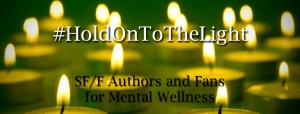
 I’ve recently returned to these early works. The rights to my first several series have reverted to me, leaving me free to do with them as I please. And I have chosen to reissue what I am calling the “Author’s Edits” (think Director’s Cut) of the books. For obvious reasons, I’ve started with my first series, the LonTobyn Chronicle, which I published back in the late 1990s. These books established me commercially and critically, and won me the Crawford Fantasy Award as the best new author in fantasy. They’re as close to my heart as any books I’ve written. But they were also my first efforts and they suffered from many of the flaws one finds in first novels. Hence the Author’s Edit. I haven’t changed any of the plotting, world building, or character work. But I’ve tightened the prose and eliminated unnecessary dialog tags, adverbs, and expository passages. The books now read better than they ever have.
I’ve recently returned to these early works. The rights to my first several series have reverted to me, leaving me free to do with them as I please. And I have chosen to reissue what I am calling the “Author’s Edits” (think Director’s Cut) of the books. For obvious reasons, I’ve started with my first series, the LonTobyn Chronicle, which I published back in the late 1990s. These books established me commercially and critically, and won me the Crawford Fantasy Award as the best new author in fantasy. They’re as close to my heart as any books I’ve written. But they were also my first efforts and they suffered from many of the flaws one finds in first novels. Hence the Author’s Edit. I haven’t changed any of the plotting, world building, or character work. But I’ve tightened the prose and eliminated unnecessary dialog tags, adverbs, and expository passages. The books now read better than they ever have.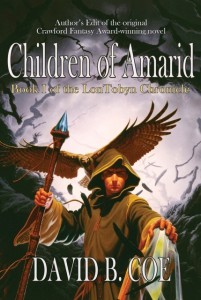
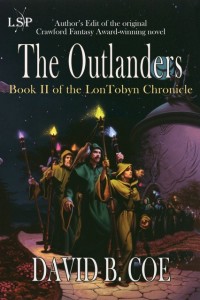 Now, I find that I’m ready to turn back. Reading and editing Children of Amarid, my very first novel, as I prepared for its re-release, I found myself transported back to those days when I was writing the book without a contract, dreaming of one day becoming a published author. I had read many of the great epic fantasists of my youth: Tolkien and Donaldson, Kurtz and Kerr, McCaffrey (yes, I know — she considered herself an author of Science Fiction; I thought of it as fantasy), LeGuin, Brooks, and Eddings. Those were the authors who attracted me to this career, and when I wrote the LonTobyn Chronicle, I tried to draw upon what I saw as the finest qualities of their work. I’m not so full of myself as to claim that I succeeded with this first effort. But they were my inspirations, and fantasy, as they defined the field, was my first love.
Now, I find that I’m ready to turn back. Reading and editing Children of Amarid, my very first novel, as I prepared for its re-release, I found myself transported back to those days when I was writing the book without a contract, dreaming of one day becoming a published author. I had read many of the great epic fantasists of my youth: Tolkien and Donaldson, Kurtz and Kerr, McCaffrey (yes, I know — she considered herself an author of Science Fiction; I thought of it as fantasy), LeGuin, Brooks, and Eddings. Those were the authors who attracted me to this career, and when I wrote the LonTobyn Chronicle, I tried to draw upon what I saw as the finest qualities of their work. I’m not so full of myself as to claim that I succeeded with this first effort. But they were my inspirations, and fantasy, as they defined the field, was my first love.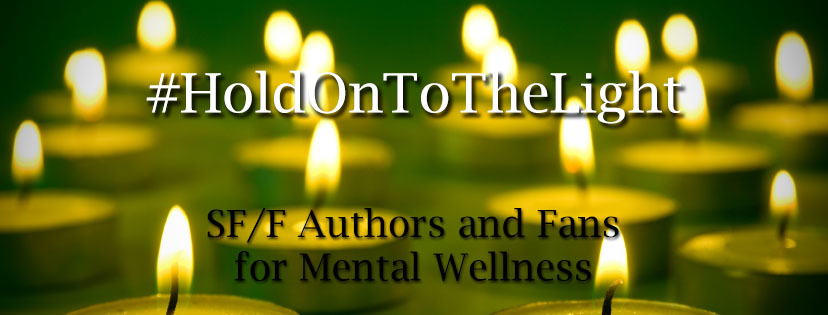
 Chris Kennedy is a bestselling Science Fiction/Fantasy author and speaker, a former naval aviator and elementary school principal. Chris’ stories include the “Occupied Seattle” military fiction duology, “The Theogony” and “Codex Regius” science fiction trilogies, and the “War for Dominance” fantasy trilogy.
Chris Kennedy is a bestselling Science Fiction/Fantasy author and speaker, a former naval aviator and elementary school principal. Chris’ stories include the “Occupied Seattle” military fiction duology, “The Theogony” and “Codex Regius” science fiction trilogies, and the “War for Dominance” fantasy trilogy.








